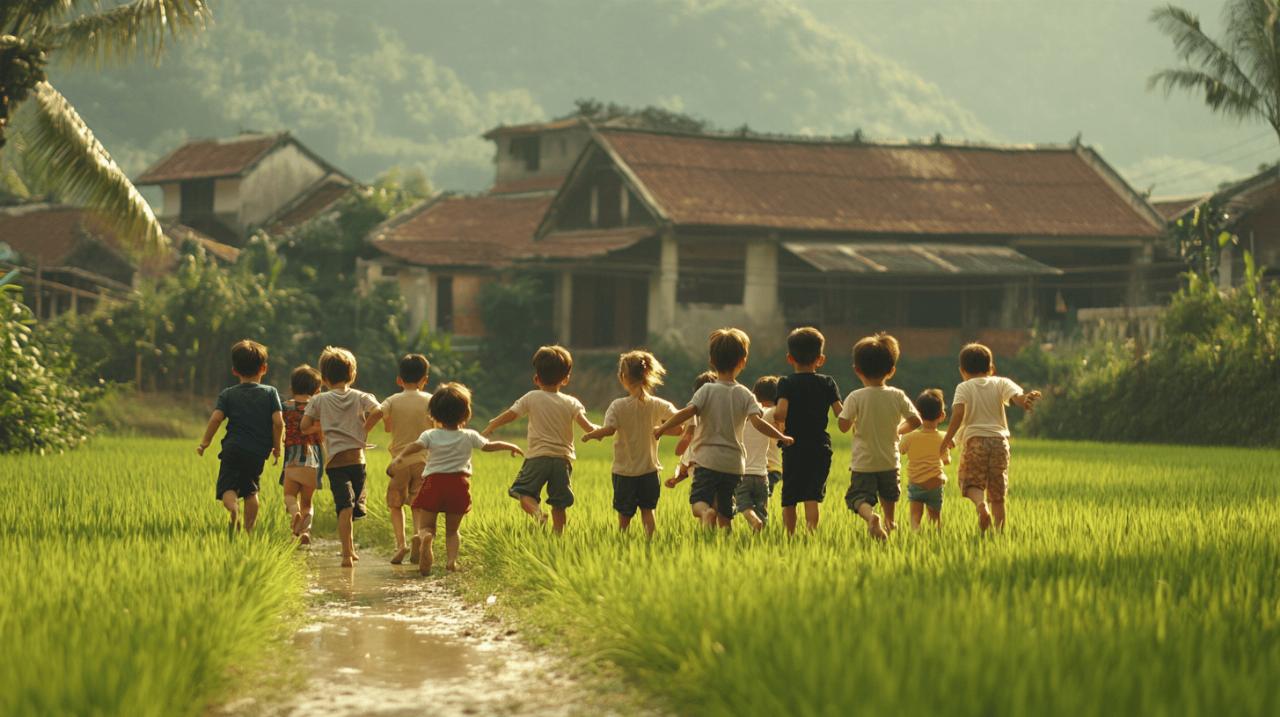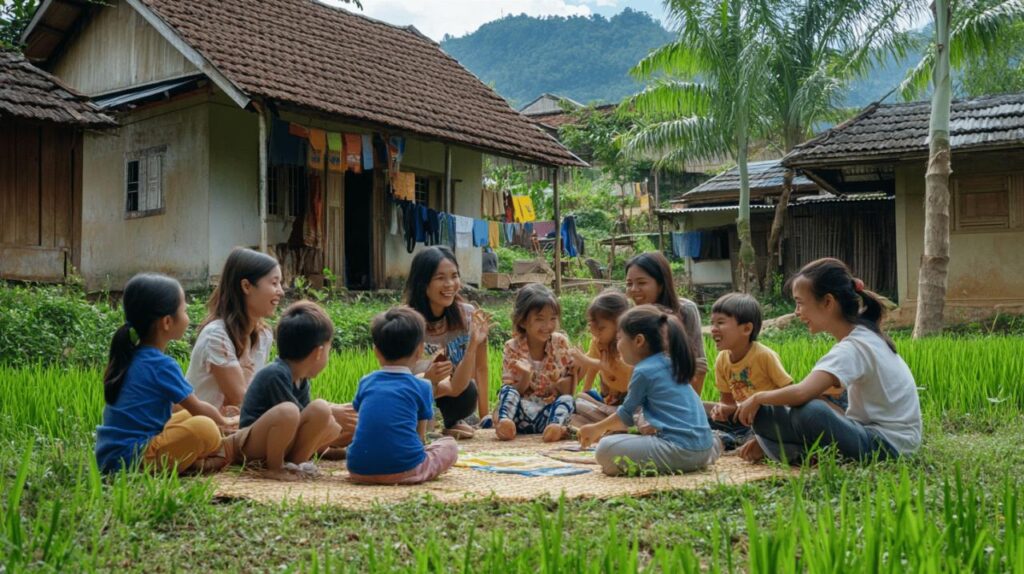Vietnam presents an extraordinary opportunity for British volunteers eager to make a meaningful difference whilst experiencing a vibrant culture and breathtaking landscapes. From the bustling streets of Hanoi to the dynamic energy of Ho Chi Minh City, this Southeast Asian nation offers a diverse range of humanitarian projects specifically designed to empower women and girls. Whether you're considering a gap year, a career break, or simply wish to dedicate a few weeks to a worthy cause, understanding how to navigate the practicalities of international volunteering will ensure your trip is both impactful and rewarding.
Understanding Humanitarian Opportunities in Vietnam: Where Your Efforts Make a Real Difference
Why Vietnam Needs Your Support: Focusing on Women and Girls in Rural and Urban Areas
Vietnam, home to a population nearing ninety-eight million, is a nation rich in tradition and natural beauty, yet it continues to face challenges in ensuring equal opportunities for all its citizens. Women and girls, particularly in rural and less developed regions, often encounter barriers to education, economic independence, and social mobility. Many community projects have emerged to address these disparities, offering support through education initiatives, skills training, and social assistance programmes. Women empowerment projects in various locations aim to provide resources and knowledge that enable local women to become self-sufficient, challenge traditional limitations, and contribute more fully to their communities. Volunteers from abroad play a vital role in these efforts, bringing fresh perspectives, teaching expertise, and international solidarity that can inspire lasting change. The emphasis on teaching English, for instance, opens doors for young women and girls to access better employment prospects and higher education, whilst childcare volunteering supports vulnerable children, many of whom benefit from improved care standards and educational enrichment.
Types of Volunteering Programmes Available: From Education Initiatives to Women's Empowerment Projects
The range of volunteer programmes in Vietnam is remarkably varied, catering to different skills, interests, and timeframes. Education remains a cornerstone, with teaching English being one of the most sought-after roles, particularly in schools around the Cau Giay District in Hanoi. These positions allow volunteers to work directly with students, enhancing their language skills and boosting their confidence. Childcare volunteering extends to daycare centres and specialised facilities such as the Friendship Village, which provides care for children affected by historical challenges, and the Khanh Tam Center. Beyond education, community development projects focus on women's empowerment, offering training in skills that promote economic independence and social resilience. Some programmes also incorporate environmental conservation and marine conservation activities, allowing volunteers to contribute to sustainable travel efforts whilst supporting local ecosystems. Wildlife conservation projects and animal care initiatives provide additional avenues for those passionate about protecting endangered species and promoting environmental awareness. Student internships and training courses are also available, offering structured learning experiences that complement academic studies or career development. Many organisations facilitate gap year opportunities and international volunteering placements, ensuring that volunteers of all ages and backgrounds can find a project that aligns with their goals and values.
Preparing for Your Journey: Essential Documentation and Health Considerations for British Volunteers
Visa Requirements and Application Process: What British Citizens Need to Know Before Departure
Understanding visa requirements is a crucial first step in planning your humanitarian trip to Vietnam. British citizens benefit from relatively straightforward entry procedures, with many visitors eligible for a visa on arrival, depending on the length and nature of their stay. For volunteer work, it is essential to verify the specific visa category that applies to your programme, as requirements can vary based on the duration of your placement and the organisation hosting you. Most volunteer placements lasting a few weeks may fall under tourist visa regulations, but longer commitments or internships might require additional documentation. It is advisable to consult official government resources or contact the Vietnamese embassy in the United Kingdom well in advance to ensure you have the correct paperwork. Some organisations provide guidance on the application process and may assist with obtaining necessary approval letters or invitation documents that facilitate visa issuance. Keeping your passport valid for at least six months beyond your intended departure date and ensuring you have sufficient blank pages for stamps are practical steps that help avoid complications at the border.
Vaccinations, Health Precautions, and Travel Insurance: Staying Safe and Covered Throughout Your Mission
Health and safety should be at the forefront of your preparation. Before departing for Vietnam, schedule a consultation with your GP or a travel health clinic to discuss recommended vaccinations and health precautions. Common immunisations for travellers to Southeast Asia include Hepatitis A and B, Typhoid, and Japanese Encephalitis, depending on your itinerary and the areas you plan to visit. Malaria prophylaxis may be advised if you are travelling to rural or forested regions, although major cities such as Hanoi and Ho Chi Minh City typically pose a lower risk. Staying hydrated in Vietnam's tropical climate is essential, as is being cautious with street food and tap water to prevent gastrointestinal issues. Comprehensive travel insurance is non-negotiable for any volunteer placement. Your policy should cover medical emergencies, accidents, repatriation, and third-party liability, ensuring you are protected in the event of unexpected incidents. Many volunteer organisations, including those requiring Freepackers Care standards, mandate that participants hold adequate insurance before commencing their projects. Review your policy carefully to confirm that volunteer work is included in the coverage, as some standard travel insurance plans may exclude activities undertaken in a professional or semi-professional capacity. Carrying a small medical kit with basic supplies such as plasters, antiseptic, pain relief, and any personal prescription medications will help you manage minor health issues independently.
Practical Arrangements on the Ground: Accommodation, Safety, and Cultural Awareness in Vietnam
Finding Suitable Accommodation in Hanoi and Ho Chi Minh City: Budget-Friendly Options for Volunteers
 Accommodation arrangements vary depending on the organisation coordinating your volunteer placement. Many programmes provide shared volunteer housing, typically in same-gender rooms equipped with air conditioning and Wi-Fi, ensuring a comfortable and supportive environment. In Hanoi, volunteer houses are often located within forty-five minutes by bus from the Old Quarter, offering easy access to the city centre whilst remaining affordable. These communal living spaces foster camaraderie among volunteers and provide a safe base from which to explore the city and engage with your project. Meals are commonly included on weekdays, featuring local Vietnamese cuisine that allows you to experience authentic flavours and culinary traditions. Weekends, however, may require you to arrange your own meals, presenting an opportunity to venture out and sample the diverse food scene, from street vendors to social enterprises such as Sozo's Café, Mani, and JOMA Café and Bakery. For those seeking alternative accommodation, budget-friendly hostels, guesthouses, and homestays are widely available in both Hanoi and Ho Chi Minh City, catering to a range of preferences and financial constraints. Booking platforms and local recommendations can help you identify reputable establishments that offer good value, cleanliness, and proximity to public transport.
Accommodation arrangements vary depending on the organisation coordinating your volunteer placement. Many programmes provide shared volunteer housing, typically in same-gender rooms equipped with air conditioning and Wi-Fi, ensuring a comfortable and supportive environment. In Hanoi, volunteer houses are often located within forty-five minutes by bus from the Old Quarter, offering easy access to the city centre whilst remaining affordable. These communal living spaces foster camaraderie among volunteers and provide a safe base from which to explore the city and engage with your project. Meals are commonly included on weekdays, featuring local Vietnamese cuisine that allows you to experience authentic flavours and culinary traditions. Weekends, however, may require you to arrange your own meals, presenting an opportunity to venture out and sample the diverse food scene, from street vendors to social enterprises such as Sozo's Café, Mani, and JOMA Café and Bakery. For those seeking alternative accommodation, budget-friendly hostels, guesthouses, and homestays are widely available in both Hanoi and Ho Chi Minh City, catering to a range of preferences and financial constraints. Booking platforms and local recommendations can help you identify reputable establishments that offer good value, cleanliness, and proximity to public transport.
Navigating local customs and staying safe: respecting vietnamese culture whilst protecting yourself
Cultural sensitivity is paramount when volunteering in Vietnam. Understanding and respecting local customs will enhance your experience and help you build trust within the communities you serve. Dressing moderately is appreciated, particularly when visiting religious sites or working in educational settings. Removing your shoes before entering someone's home is a common courtesy, and learning a few basic Vietnamese phrases demonstrates respect and a willingness to engage. Avoiding public displays of affection and being mindful of social norms around personal space and communication styles will help you navigate interactions smoothly. Photography is a wonderful way to capture memories, but always seek permission before photographing locals, especially children, to avoid causing discomfort or misunderstanding. Vietnam is generally considered a safe destination for travellers, though standard precautions are advisable. Petty theft can occur in crowded areas, so keep your valuables secure and avoid displaying expensive items such as jewellery or high-end electronics. Using official taxis or reputable ride-hailing apps minimises the risk of overcharging or unsafe travel. Travelling alone at night, particularly in unfamiliar neighbourhoods, should be approached with caution. Staying connected with your local coordinator and fellow volunteers, and informing someone of your plans, are simple steps that contribute to your overall safety. Responsible tourism involves supporting local businesses and social enterprises, which helps ensure that your spending benefits the community directly. Establishments such as Pots and Pans Restaurant, Villa Aria, and Quan An Cu Duc, as well as organisations like Mekong Quilts and Reaching Out Vietnam, offer quality services whilst contributing to social causes.
Making a Lasting Impact: How to Maximise Your Contribution to Women's and Girls' Development
Effective Engagement Strategies: Building Trust and Meaningful Connections with Local Communities
Achieving a meaningful impact during your volunteer placement requires more than enthusiasm; it demands patience, flexibility, and a genuine commitment to understanding the needs of the community. Building trust with the women and girls you aim to support begins with active listening and a willingness to learn from their experiences and perspectives. Avoid approaching your role with preconceived notions or assumptions about what the community requires. Instead, collaborate with local coordinators and community leaders to identify priorities and tailor your contributions accordingly. Teaching English effectively, for example, involves adapting your methods to suit different learning styles and cultural contexts, making lessons engaging and relevant. Childcare volunteering benefits from consistency and sensitivity, recognising that vulnerable children may have experienced trauma or instability. Your presence and attention can provide emotional support and stability, but it is essential to maintain appropriate boundaries and follow the guidance of experienced local staff. Engaging with women empowerment projects often involves facilitating workshops, sharing skills, or supporting small business initiatives. Empowering women to lead and make decisions is more impactful than imposing external solutions, so your role should be one of encouragement and facilitation rather than direction. Cultural immersion enhances your effectiveness as a volunteer. Participating in local festivals, trying traditional foods such as Goi Cuon, Banh mi, Cao Lau, and Pho, and exploring historical sites like the Cu Chi Tunnels and Hoi An deepen your understanding of Vietnamese heritage and strengthen your connection to the community.
Continuing Your Support Beyond Your Visit: Long-Term Involvement and Staying Connected with Projects
The end of your volunteer placement does not have to mark the end of your contribution. Sustaining your support and maintaining connections with the projects and people you have worked with can amplify your impact and provide ongoing encouragement to local initiatives. Many organisations welcome continued engagement through fundraising, awareness campaigns, or remote volunteering opportunities such as online tutoring or administrative assistance. Sharing your experiences through social media, blogs, or community talks raises awareness about the challenges and successes of humanitarian work in Vietnam, inspiring others to get involved. Donating to reputable non-profits that focus on women's and girls' education, health, and empowerment ensures that your financial contributions support proven programmes with transparent operations. Staying in touch with fellow volunteers and local coordinators fosters a network of advocates and supporters who can collaborate on future projects or respond to emerging needs. Ethical volunteering involves reflecting on your experience and considering how your actions aligned with principles of responsible tourism and community development. Honest self-assessment and feedback to the hosting organisation contribute to the continuous improvement of volunteer programmes, benefiting future participants and the communities they serve. Whether you return to Vietnam for another placement, support projects from afar, or apply the lessons learned to humanitarian efforts closer to home, your commitment to empowering women and girls can create ripples of positive change that extend far beyond your initial visit.



